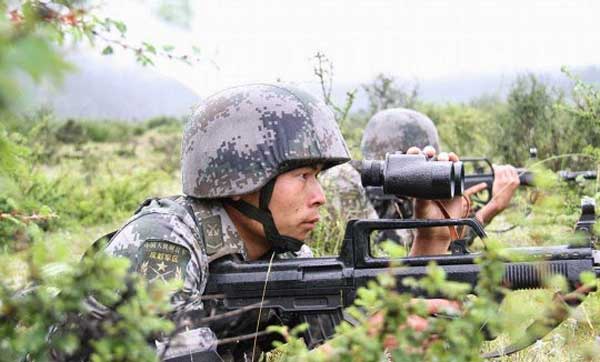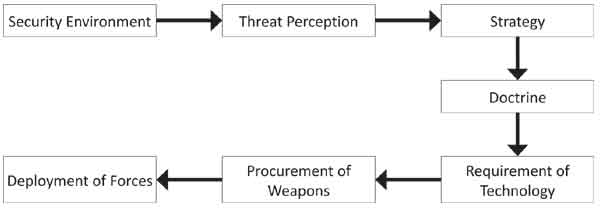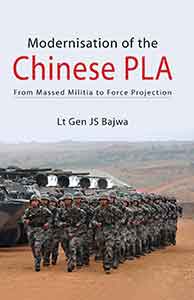Some of the major events of the recent past, that have influenced Chinese strategists in seeking a contemporary military strategy have been the Tiananmen incident of 1989; the weakening and then the fall of the Soviet Union; the Gulf War; the NATO operation in Kosovo and bombing of the Chinese Embassy in Belgrade; the imposition of the “No Fly Zone” in Iraq coupled with the punitive air strikes; and the creation of the state of East Timor through international intervention.
The traditional model for the sequential evolution of doctrine through the stages of weapon development, procurement and its effective deployment is as given below:
The major events can be analyzed one by one to assess the impact on Chinese strategic decision-makers:
China had seriously objected to NATO’s unilateral intervention into Kosovo on the pretext of humanitarian ground. China feels that it can also be targeted by Western countries on such-like pretexts.
Tiananmen. The strength and duration of the student occupation of the Tiananmen Square in 1989 were profoundly disturbing to the Chinese leadership and had several consequences. One was the dismissal of the moderate leadership of Prime Minister Zhao Ziyang bringing into the open inner Party conflicts on major policy issues. Second, was the sense among the hard-liners that the aim of the demonstrators was to bring down the Communist Party and this was being instigated by certain western powers. They blamed it on Deng’s policy of opening China to foreigners which ‘polluted’ the minds of the youth with ideas such as democracy and freedom of the press.31 Post-Tiananmen analysis indicated what the party called the “three belief crisis” as mentioned above. This resulted in a renewed definition of nationalism, which came to be linked to Party loyalty.
The Fall of the Soviet Union. The weakening of USSR freed Beijing from the confines of a strategic relationship with the US. However, the fall of the Soviet Communist Empire brought with it some lessons. The political reforms, especially the tolerance of free debate allowed by Mikhail Gorbachev and his willingness to dilute the Communist Party’s monopoly on power, had led to the ousting of the Soviet Party altogether. The Chinese felt that to be soft was to lose power.32 The other lesson emerging from the break-up of the Soviet Union was that its military might had been created on a non-self-sustaining and weak economic base.
The Gulf War. Military and strategic experts around the world stress the importance that China attached to the awesome technical-military power shown by the US in this war. It gave a new focus to China’s military modernization involving such developments as the reprioritizing of the modernization program to give priority to developing the air force and the navy and its missile development program. The immediate result was the enhanced accuracy of medium range missile of the sort that was fired near Taiwan in March 1996.33
These events served to reinforce and even increase the PLA’s sense of urgency in pursuing the notion of “active defense” and pre-emptive strikes, as also developing a credible second strike nuclear capability.
NATO Operations in Kosovo. China had seriously objected to NATO’s unilateral intervention into Kosovo on the pretext of humanitarian ground. China feels that it can also be targeted by Western countries on such-like pretexts. From the military point of view, the operation in Kosovo showed a degree of sophistication beyond that evinced during the Gulf War. Chinese analysts contrasted the two by saying that, whereas the former had some characteristics of modern high-tech war, the latter was a truly modern high tech war with “hyper-conventional” features that must be analyzed and digested if the PRC were to be able to defend itself properly. Information warfare (xinxi zhanzheng) was the wave of the future.34 The bombing of the Chinese Embassy in Belgrade was considered a deliberate act by the US to expose China’s inability to react.
After the NATO bombing raids against Yugoslavia began, PLA’s deputy Chief of the General Staff General Xiong Guangkai hosted a one-day seminar to debate the strategy against an “increasingly unstable international environment.” The approximately 100 attendees including economists and foreign policy experts as well as retired and active military figures were said to have reached consensus that “unholy military alliances” were being strengthened and gun-boat policies are once again running rampant, and concluded that “China must develop plans to protect itself”.35
Imposition of No-fly Zone. China saw such actions as being those that could be replicated in the event of a deteriorating situation on the issue of Taiwan or the South China Sea.
Intervention in East Timor. The international force led by Australia coming to the aid of the East Timorians at their behest, resulting in the dismemberment of a segment of Indonesian territory, augurs ominous portents for China. This only strengthened its resolve to safeguard its sovereignty at any cost.
These events served to reinforce and even increase the PLA’s sense of urgency in pursuing the notion of “active defense” and pre-emptive strikes, as also developing a credible second strike nuclear capability. Many officials in the PLA view the Kosovo conflict as the first example of a purely “no contact” war, in which control of aerospace and information system were the deciding factors.36
Notes
31. Richard Bernstein and Ross H Muntro, The Coming Conflict with China, (Vintage Books, Random House, Inc, New York, 1998), p. 40.
32. Ibid.
33. Ibid., p. 41.
34. June Teufel Dreyer, The PLA and the Kosovo Conflict US Army War College, May 2000, pp. 4-5.
35. Ibid., p. 5.
36. n. 29., p. 7.








The article presents a very clear picture on the apprehensions or reasons behind Chinese military policies. No doubt it is evident that it is well researched and equally eloquently written.
Question would be what India as a neighbor to China has to learn from it?
Are we advancing ourselves in the same pace ? Or are we just tied to the same lamp post due to political reasons.
I was talking with my father about his experience while working with you and thought to search for you over internet, he had the opportunity to serve under your command. Which he remembers as his best work experience in Indian army.
Thank you Pankaj for your Fathers so very generous remarks. I feel privileged to have served with such officers. I always tapped the maximum potential of every subordinate who served with me and they gave their fullest unstinting support.
I feel so honoured.